Sam Peckinpah's 1971 classic Straw Dogs is now widely regarded as a masterpiece; a complex and unnerving psychological thriller showcasing strong performances from Dustin Hoffman and Susan George. In recognition of its standing, The
Criterion Collection released the film in a special edition DVD set in 2003 that quickly went out of print.
Released during the early 1970s, Straw Dogs was one of a handful of films at the time that generated significant public discourse about the
rise of violence in film, and the picture had a tough time in the west when it fell into the laps of the censors. In this month's Cutting Edge, we'll be taking a look at the censorship history of Straw Dogs in both the UK and the United States.
To understand the troubles that Straw Dogs had with both the MPAA and the BBFC, it is necessary to be aware of an important scene; a thematically complex rape sequence that occurs around halfway through the film. After Amy finds herself
increasingly frustrated with the growing distance between herself and her husband David, her ex-boyfriend Charlie comes onto her and, whilst she initially refuses his advances, Amy appears to consent to intercourse with him as a tear rolls down her
cheek. Following their encounter, Charlie's acquaintance Norman slips into the house and forces Charlie at gunpoint to restrain Amy so that he too can have his way with her and Amy reacts violently to the assault.
Censorship through the back door: Informal pre-cuts required for UK cinema release
 |
Stephen Murphy
BBFC Secretary (1971-1975)
|
In the UK, Straw Dogs was first seen by then-BBFC Secretary Stephen Murphy in August 1971. At this time, the film was in post-production and the filmmakers wished to see if anything could be done to the film to make it suitable for the
new AA rating; a rating broadly equivalent to the UK's modern 15 rating (the AA rating stipulated that a film was suitable for those 14 and over).
Murphy's opinion was that not only was the film entirely unsuitable for an AA rating,
but that cuts would be required even for an X rating (equivalent to the modern 18 rating in the UK).
Cut Scenes: Pre-cuts for UK cinema release Murphy's cuts stipulated that -- amongst others -- the second part of the rape sequence would need reducing, particularly footage that showed Norman entering Amy
from behind, along with the death of Charlie in a bear trap during the film's finale.
|
The filmmakers implemented these cuts during the post-production process, with producer Dan Melnick writing to Stephen Murphy later in August 1971 to inform him that the necessary alterations had been made. This cut of Straw Dogs is the version widely
known as the 'uncut version', and is how we will be referring to it in the following discussions (since the material removed during post-production no longer exists and has never been reinstated).
The film was formally submitted for a BBFC
certificate in November 1971 and the Board's response to the film was positive overall. However, some examiners cited the rape sequence as being potentially problematic. Murphy's reductions to Norman's assault on Amy seemed to imply that anal sex was
taking place, and not rear entry sex. Ironically, Murphy's changes to the scene in post-production appeared to have made things worse. Murphy defended this, stating that the initial cut of the scene was:
...far too
long -- giving, it seemed to me, the feeling that the film was wallowing in it.
Following reservations from BBFC examiners, Stephen Murphy admitted that the false impression given by the scene was unfortunate, but noted in writing
that:
There is a trim available which proves beyond doubt that the present impression [of anal sex] was not intended.
In any case, Murphy stipulated that the film would have to be passed intact in
the form it was submitted. Straw Dogs was thus classified in its uncut version for theatrical release on November 3rd 1971 with an X rating.
Assaulted by censors: Further cuts required for US
theatrical release
On the other side of the pond in America, the film was also seen by the MPAA. The version submitted was the uncut version as passed by the BBFC, and the film was lumbered with an X rating. As we've discussed in previous episodes
of the series, the X rating in America was seen as the 'kiss of death' as it automatically carried with it connotations of pornography. Straw Dogs, of course, is not a pornographic film and the distributors took it upon themselves to produce an edited
version that would be suitable for the more commercially-lucrative R rating.
Cut Scenes: Charlie and Norman rape Amy Around 85 seconds of the rape scene was altered by cutting and rearranging footage, and this cut version of Straw Dogs was passed with an R rating and later released
on home video. A full comparison of the differences between the uncut version and the R rated version can be viewed below, but the main deletions in the R rated version include:
- Charlie thrusting into Amy in close- and medium shot as she moans
- Amy being held down by Charlie as Norman approaches her from behind
- Almost a minute of Norman assaulting Amy as Charlie looks on
- Norman finishing his assault and smiling at Charlie as he leaves
- Charlie letting go of Amy, and Amy turning over on the couch in a daze
Ironically, although these cuts were made to reduce the length of the sequence, they arguably make the rape worse. By removing much of the second part of the scene, and therefore Amy's clear horror at Norman's assault on her, the suggestion is that
Amy perhaps enjoys or accepts her experience. This was not the intention of Sam Peckinpah when he conceived of the scene.
|
Ferman launches a 14 year siege: Multiple UK video releases banned by the BBFC
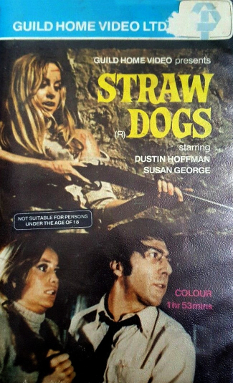
Fast forward to the early 1980s in the UK, when there was no legislation that required the classification of videotapes for
rental or sale. Straw Dogs was released uncut by Guild Home Video, and would go on to be available for some time. In 1984, however, the British government implemented the Video Recordings Act (VRA) that stipulated that any and all videos supplied for
rental or sale in the UK would need to be classified by the BBFC, and Straw Dogs would require an official classification by March 1988 or have to be pulled from British stores.
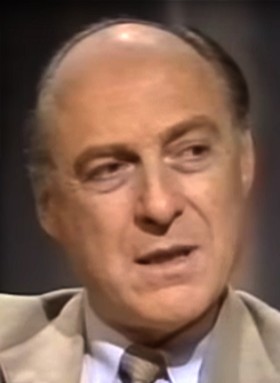 |
James Ferman
BBFC Secretary (1975-1999)
A believer in the 'censorship myth'...
that when it comes to sexual violence, viewers secretly yearn for forceful intervention by censors
|
In August 1986, a company called Futurevision submitted the uncut version of Straw Dogs for a BBFC video certificate. By this time, James Ferman was Secretary of the BBFC and for reasons best known to himself, postponed the classification of the film.
As his successor Robin Duval later noted:
James Ferman had a habit of slipping intractable problems -- quite literally -- into the capacious bottom drawer of his magnificent, leather-lined desk.
As
time progressed, Futurevision became aware that Straw Dogs was unlikely to be passed any time soon and their rights to the title expired, meaning that a video release was not possible.
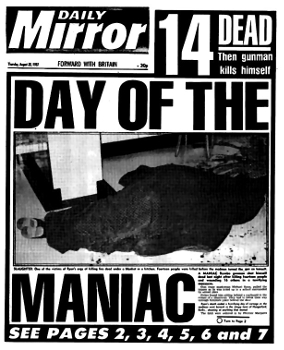
By the time 1987 came around, the film's new rights owners, VCI, resubmitted the uncut version of the
film for a video classification. Tragically, on August 19th , the Hungerford massacre took place, which reignited a discussion in the media about violence in film. As a result, James Ferman spoke to VCI and told them that Straw Dogs was "too
violent" to be passed in the current climate. Ferman slipped the film into his desk, with a view to taking a fresh look at it the following year -- before stalling once again. The classification cut-off date of March 1988 was fast approaching, and
thus the remaining unclassified stock of Straw Dogs videos was removed from UK stores.
Nineteen-ninety saw a third video submission of the uncut version to the BBFC, again by the distributors VCI. Frustratingly, Ferman once again refused to pass
the film, stating that the rape sequence was the key issue on video; a medium which permitted the replaying of scenes out of context. Ferman argued that viewing the rape scene in such a manner could be seen as a dangerous endorsement of the male 'rape
myth' that women secretly enjoy being raped. On the other hand, he also stated that the film was too good to be subjected to cuts, but that the rape scene was too difficult to cut anyway. Once again, the film was to remain unavailable to British
consumers.

By the time 1995 came around, the British Film Institute was keen for the film to seen in the UK
in some way. Since they realised that Ferman's issue with the film centred around the rape scene being played out of context in the home, they concluded that a cinema release would at least make Straw Dogs available to grown adults who wished to see it.
Straw Dogs was thus submitted for a UK cinema certificate and Ferman passed the film uncut on April 20th 1995, at the same time informing the BFI that a video certificate would not be forthcoming. However, the version of the film that was classified on
film was the censored R rated version as released in America, with heavy reductions in the rape scene. As a result, British fans were still unable to see the uncut version.
In the September of 1995, Polygram asked Ferman if it would be possible to
release a version of Straw Dogs on video, given that the cinema release had passed without outrage or issue. But Ferman refused, citing changes to the Video Recordings Act in 1994 that required the BBFC to be stricter with regards to classifying films
for viewing in the home. He also claimed that he had received expert medical advice that stated that convicted rapists cited the rape scene in Straw Dogs as having being a turn-on for them. Polygram decided not to bother with a video submission.
Total Home Entertainment were the next company to submit Straw Dogs for a video classification in 1996, only this time the R rated version was submitted. Ferman tried to fob the company off with excuses, but they insisted on a formal verdict. No doubt due to Ferman's overbearing influence, Straw Dogs slowly progressed through the BBFC for over two years, but as 1998 wore on Ferman's retirement was upcoming and he felt it wasn't right to make such a big decision before his replacement Robin Duval took his place. Ferman stopped the process, electing instead to have Duval examine the film when he replaced Ferman as Director in January 1999.
 |
Robin Duval
Director of the BBFC (1999-2004)
Putting an
end to the closed community mentality of his predecessor.
|
As if things weren't already confusing enough, VCI submitted the film for a video classification in November 1998; only this time it was the uncut version of the film. Before any action would be taken, the BBFC had to reach a decision on the previous
submission by Total Home Entertainment in 1996. Robin Duval informed the company that Straw Dogs could receive an 18 certificate if they made around 200 seconds of cuts to the rape scene in order to remove the forcible stripping of Amy, along with any
footage that suggested that she was "enjoying" the rape. This stance is quite understandable, given that the R rated version the company submitted already removes much of the second part of the sequence that makes it clear that Amy responds
entirely negatively to the experience. Nevertheless, since James Ferman had dragged out the classification process for so long, the company's rights to the film had expired and they were unable to implement the cuts. As a result, Straw Dogs was rejected
by the BBFC on March 15th 1999.
The BBFC then looked at the VCI submission from late 1998, and stipulated to the film company that the 200 seconds of cuts were required. But VCI had also lost their rights to the film by this time, and yet again
Straw Dogs was rejected by the BBFC on June 2nd 1999.
Siege Ends: BBFC passes the film uncut for home video
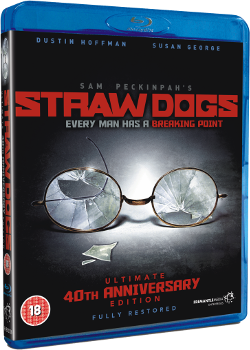 |
Straw Dogs on UK Blu-ray
Celebrating 40 years
since it was first censored.
|
Two years later, Straw Dogs was submitted to the BBFC for the seventh time by FreemantleMedia, and once again the version submitted was the uncut 1971 version as seen in British theatres. By this
point, new BBFC classification guidelines were in place. The Board also showed the video to three clinical psychologists who specialised in working with sex offenders. All of them agreed that the second part of the rape sequence dispelled any notice of
the male 'rape myth' and the film was unlikely to pose any problems to society at large. Furthermore, the psychologists stated that the ambiguous first rape was a realistic depiction of a complex situation, and that Amy's flashbacks to her upsetting
experience later in the film further undermined any impression that she might welcome the act of rape or that it has no serious effect on its victims. A focus group of 26 members of the British public also viewed the uncut version of Straw Dogs, with 20
people declaring 18 uncut as the most appropriate rating, five suggesting only minor cuts, and only one participant calling for an outright ban of the film. No one on the panel suggested major cuts anywhere near the kind demanded by the BBFC in 1999.
Finally, after more than 30 years, Straw Dogs was passed by the BBFC uncut on video on September 27th 2002. This uncut version is the standard version available on DVD and Blu-ray in the UK.
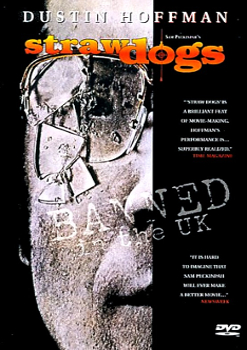 |
The original uncut US DVD release from Anchor Bay
|
In America, fans have had access to the uncut version for some time. An unrated version was first made available on VHS in widescreen from Anchor Bay in late 1996, with an uncut DVD release following in January 1999. The Criterion Collection DVD that
was released in 2003 also featured the uncut version, and recent releases from MGM on DVD and Blu-ray are also uncut. Whichever format you choose, you can view Straw Dogs in its uncut version in the UK or the USA -- so long as you are picking up an
unrated version if you're in America.
Cutting Edge Video, Season Two, Episode 39: Straw Dogs








